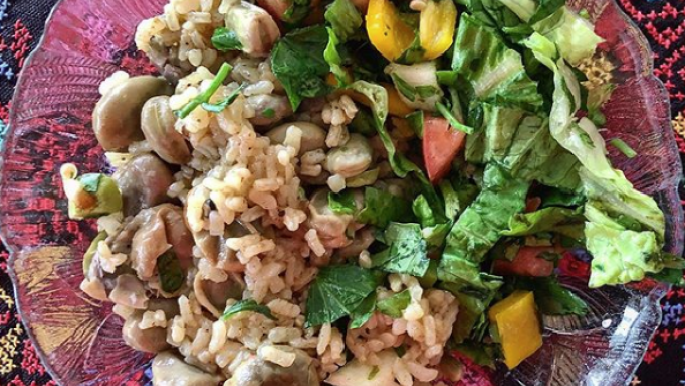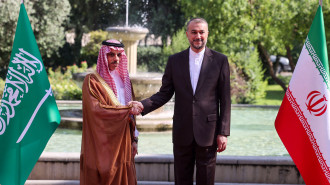Arab veganism: Back to their roots or copying the West?
With factory farming being more popular than ever, people are finding it harder to enjoy their chicken burger knowing that an animal may have been born to be tortured and commodified throughout its life before being sent to be slaughtered.
There are many debates surrounding the concept of giving up meat. For some, factory farming is the main component of eating meat.
"I find the whole meat industry very problematic," Ali Habib, who is of a Yemeni, Omani and Somali background told The New Arab.
Despite not being vegan, he has tried to go vegan a number of times and remains conscious of how his food decisions affect animals and the environment.
"I was against how the meat industry conducts itself in the slaughtering of animals and the processes. Killing animals is unethical anyway, but the way it happens I couldn't accept that I am partaking in that system. That was after watching a few documentaries and researching it," he explained.
Factory farming has also been used by halal and kosher farms to capitalise on both religious people and cutting costs with inhumane farming.
Read more: Halal Pork? World's first plant-based pork substitute unveiled
"Even though halal is marketed as being the ethical standard, and true, it is but because of how the halal industry is run globally, it's very similar to the normal meat industry,'' Ali explained.
For him and many other Muslims looking for ethical ways to eat meat, the practices used by the modern mainstream halal meat industry has made it almost impossible for them to do so.
For others, the whole concept of meat is immoral.
"I've been vegan for nine years. I became a vegetarian at age 13, because I knew eating animals was incompatible with my morals," Nadia Taha told The New Arab.
|
||
"I hardly knew any vegans and was very wary of how veganism could fit into my social life so I held off until I saw Forks Over Knives, while my dad had cancer. Health concerns seemed like an easier way to explain the change to people," she said.
Is veganism a Western construct?
As a modern concept, it is without doubt that the vegan trend grew in the Western world, as people in the West have increasingly been ditching their mayonnaise and sausages for falafel and hummus.
Food from the Middle East, Africa, Southern and Eastern Asia have become increasingly popular as a result of people wanting to expand their palette as they transition into a more plant-based diet.
Palestinians have been especially sensitive to the way their traditional food has not only been incorporated in the West, but has been gentrified and washed out of its roots. Often, food that have been staples in Palestinian fridges and pantries for centuries such as hummus, falafel, zaatar and mutabbal have been branded as Israeli.
Read also: How Israel uses animal rights to 'veganwash' the occupation
Because of the political connotations of associating Palestinian food with its true homeland, or with the problematic complexities that come with endorsing the Israeli occupation on the plates of the modern Western household, some Western companies have even decided to shy away from the whole conflict and claim traditionally Palestinian food to other countries. Hence the random rise of "Moroccan falafel", despite the fact that the North African country has no connection to the fried treat.
|
||
Palestinains, however, have noticed this trend and have decided to not only take back their food, but reconcile their lifestyle choice with their roots.
"My understanding of what it means to be Palestinian has always been filtered through a very American lens, because I was born and grew up in the US. Sometimes, diaspora distorts and homogenises cultural experience. So earlier on, I was quite concerned that somehow my diet was incompatible with my Palestinian identity," Nadia said.
It wasn't until she finally visited her homeland, her perception on veganism and Palestinian identity changed.
"Palestine taught me otherwise. For example, my entire childhood I thought I didn't like maqlooba. I wouldn't touch it when it was served at a family gathering. But then on a visit to Ibdaa, a restaurant in Dheisheh refugee camp, I ordered their maqlooba, which was vegan, and loved it. And travelling in Palestine, I've met lots of people – people who have never even left Palestine – who are vegetarian or vegan for all kinds of reasons," she explained.
Palestinian food blogger Summer Shabib agreed that vegan options are intrinsic to traditional Palestinian cuisine.
"Palestinians have been cultivating and eating everything that grows in the land for as long as Palestine has been in existence. People utilised seasonal plants in many different creative and delicious recipes, eating what grows raw, processed or cooked," she told The New Arab.
However, she believes the concept of going vegan as an official lifestyle may be influenced by the Western world.
 |
Palestinians have been cultivating and eating everything that grows in the land for as long as Palestine has been in existence |  |
"It's mostly in my opinion, a phase or a fad to try out since it's popular in the Western culture. Many young people are fascinated by the West and everything that happens in it, thinking if they do things the way Westerners do, it will make them 'belong' or 'fit in,'" she said.
Is meat healthy?
Regardless of the rise in popularity in veganism, people are becoming increasingly conscious of the negative effects of eating excess meat and dairy.
Animal products have been associated with a number of diseases, including heart disease, arthritis, cancer, diabetes and resistance to antibiotics.
 |
|
| Summer Shabib includes a range of traditionally vegan recipes of Palestine [Instagram] |
A study by the Untied Kingdom's National Health and Nutrition Examination Survey (NHANES) from 2014 concluded that people under 65 who eat vast amounts of meat, eggs and dairy are four times as likely to die from cancer or diabetes.
At the same time, those transitioning into a plant-based diet express many health concerns, including nutritional deficiencies, that may come with going vegan.
"The health benefits of veganism are vast and well-documented. The myths have been debunked," Nadia urged, citing documentaries such as Forks Over Knives and Game Changers.
"What most people don't know is that a plant-based diet can actually make you look better. Three months after I completely ditched dairy and eggs, I went to have breakfast at my grandparents' house. My Teta watched carefully as I dodged the jibne (cheese) and bayd (eggs) but filled up on foul (beans) and falafel and hummus. She took a close look at my face, observed my clear skin and bright eyes and said 'I don't understand why, but if it makes you look this good, keep doing it.'"
According to Summer, class has influenced the perception of animal products and trends surrounding veganism in the Arab world.
"People thought and still think that meat provides more nutrition than plants. Many base their knowledge on information that has been handed down for a long time without looking into the facts," she said.
"Many young Arabs who try veganism, do it as a trial, without doing their own research about the health benefits or fully understanding the extent to which animal products are harmful to the environment," she opined.
Instead of going fully vegan, Ali decided to apply some plant-based principles in his life and has seen a change in his health.
"What I decided to do is basically cut the animal products I take. I cut out milk from my diet and I try to eat meat once or twice a week, before I used to eat it every day. I definitely feel much healthier," he said.
"Even at the gym I've been getting stronger and I feel cutting out that excess fat from animal products does help."
Regardless of the intention behind the rise in veganism, plant-based options are intrinsic to many Arab cultures, which have heavily inspired and influenced the diet of vegans of the Western world.
The debate behind the ethics of eating meat is growing and with that, people are beginning to learn how to eat a balanced diet without any animal products.
Whether people are cutting down, going vegetarian, dairy free, or full on vegan, one thing is for sure – the discussion of animal rights and food is growing in the Arab world.
Diana Alghoul is a journalist at The New Arab.
Follow her vegan blog on Instagram: @flowerknafeh





 Follow the Middle East's top stories in English at The New Arab on Google News
Follow the Middle East's top stories in English at The New Arab on Google News


